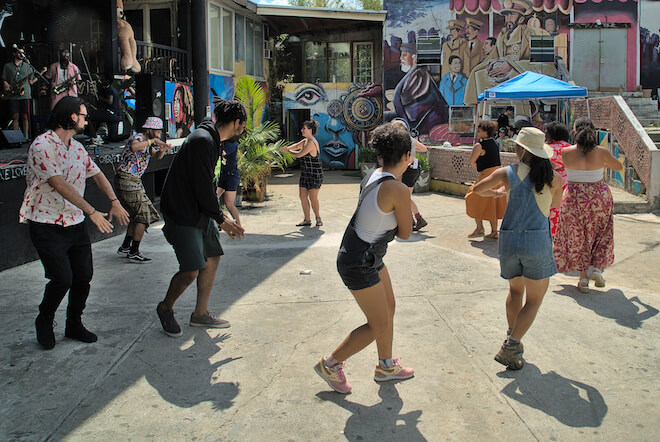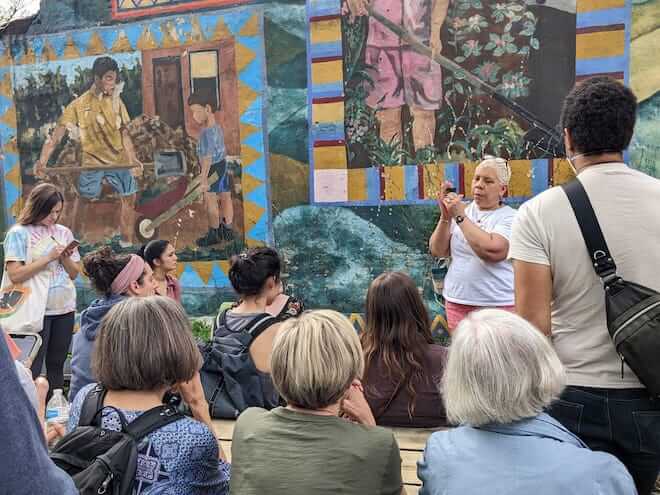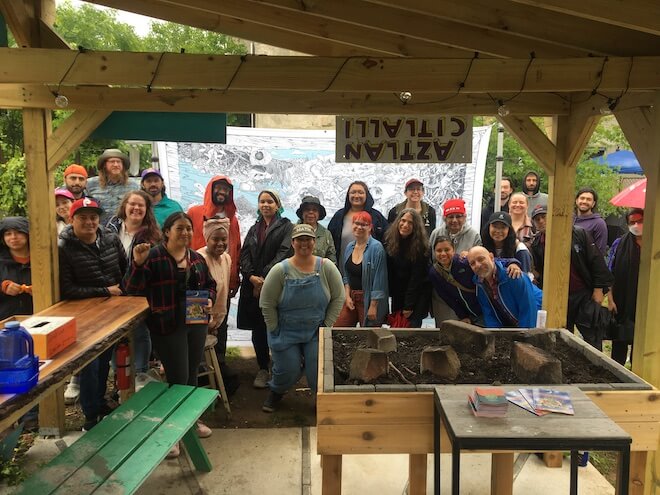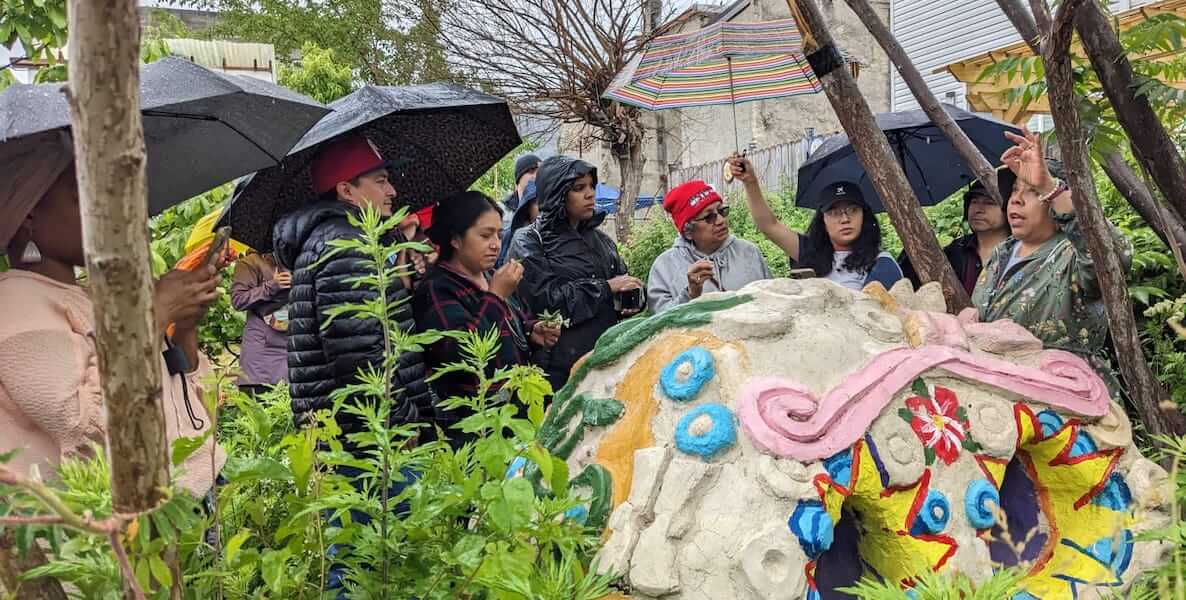What if resistance were a garden? What if growing your own vegetables/herbs, or cultivating your own garden were a revolutionary act? For the Painted Bride’s Resistance Garden project, these are not rhetorical questions.
The project aims to strengthen the connections across various urban garden and/or agricultural initiatives in Philadelphia, and to enhance community engagement with “local garden and food culture through zines, foraging tours, youth education, and artist activations at partner sites.” The program’s coordinator, Amalia Colon-Nava, is a self-professed “dirt baby” who approaches her role with equal parts humility and divine sensibility.
She playfully refers to her father as an “OG” farmer, but Colon-Nava is a serious urban farmer. She is third generation. “I’ve grown up around gardens and gardening my whole life,” she says. “My grandparents have land in Mexico which they left because it’s very hard to make a living there off of farming, but they love gardening …” For Colon-Nava, her family’s love, and the ways gardening and farming were part of her upbringing, are critical to who she is now. It explains why her work with the Resistance Garden project is important to her and to the communities that she serves (literally).
“Community gardens are places created by groups of people to grow food and community. But more than that, they are places where people come together to make things happen.” — Claire Nettle
Where things happen
The Resistance Garden project (RGP) is an important gateway for anyone — especially citizens of Philadelphia — with even a passing interest in growing their own greens. Since the spring of 2022, the RGP has partnered with eight urban farms and foragers across Philadelphia. These partnerships are designed to facilitate community engagement with food and garden culture through art, education and urban farming.

Cultivating community is key to this gardening-as-resistance movement. For RGP, “resistance means self-sustainable growing, connecting to nature, and celebrating the work of urban farms and foragers.” In many ways, growing connectivity in the community and teaching people of color how to secure their own food are revolutionary acts in and of themselves.
In her book Community Gardening as Social Action, scholar and researcher Claire Nettle argues, “Community gardens are places created by groups of people to grow food and community. But more than that, they are places where people come together to make things happen.”
The data is clear on this issue. Community gardening is an edifying force for families and individuals who live in (or around) food insecure neighborhoods. It helps to improve physical and mental health, increase life expectancy and promote connections. A garden cannot replace a grocery store or eliminate the need for them in any of the many food deserts in a city like Philadelphia. But it can help individuals improve their well-being and develop nutritional habits that are sustainable and affordable.
“Our mission is to uplift and highlight the work of the urban farms in Philadelphia,” Colon-Nava says, “to connect them, to program more reasons and opportunities for them to all get together and to build more strength in the community.” She highlights Farm Philly as an important model for the gardening-as-resistance movement. According to Colon-Nava, Farm Philly, the city’s initiative to support urban agricultural projects in various neighborhoods, “is the only city-run urban agricultural program,” Colon-Nava says. “The Urban Agricultural Plan outlines goals for a sustainable urban farm network in Philadelphia.”
Gardening is an organic solution to an important problem: concentrated poverty in the city of Philadelphia. People can keep it simple and still contribute to the advancement of a global movement that embraces permaculture in urban environments. For the architects of the Resistance Garden project, part of the mission is to cultivate abundance by “examining and redefining our relationships with nature, farming, food politics, and the cultural use of plants through the arts.”

Uplift is the way
All of this was on display this past June at the Resistance Garden Project’s fundraising event hosted at One Art Community Center in West Philadelphia. The urban garden/farm behind One Art was a compelling mix of found/repurposed objects, plants, gardens, vegetation and an actual farm. (One Art is one of the partners with the Resistance Garden project.) In the courtyard space where the program took place, various vendors sold their wares: food, clothing and information. The mix of vendors, music, and community activists reflected the spirit of movement politics in Philadelphia, a sense that something secret but also significant was in the air. People were there to make something happen. The event raised over $10,000.
In addition to coordinating the programs on behalf of the Resistance Garden Project, Colon-Nava is also a co-founder and the artist and community coordinator for Dirtbaby Farm, a creative farm business in Northwest Philadelphia that grows fresh organic herbs. Dirtbaby runs a Community Supported Agriculture (CSA) subscription service, offering customers who pay at the beginning of the season — including through SNAP benefits — 20 weeks’ worth of produce all summer. Dirtbaby is exactly the kind of farm that benefits from the Painted Bride’s Resistance Garden project.

Dirtbaby Farm is having their final artist residency event on November 13 from 7 to 9pm at the MAAS building in Philadelphia. It’s a record release party featuring Joshua Marquez, a Philadelphia-based Filipino American composer — a celebration of art as an integral aspect of the community gardening and urban farming movements. “Art has been a huge part of urban gardens for a really long time,” says Colon-Nava. Urban art and the reclamation of public spaces through art projects is one of the tactics through which gardeners and farmers are able secure land for urban agriculture and to generate more community engagement. “All of these farms (in the RGP) were already working with artists,” says Colon-Nava. “They already had some kind of art programming or youth programming and we just came in and we uplifted the work that they were doing.”
Uplift feels like the watchword for the Painted Bride’s Resistance Garden project. In just over a year, the RGP has worked in “arts and urban gardening with more than 60 Black and Brown youth, 10 local artists, nine urban gardens and foragers, and an audience of over 2,300 Philadelphians.”
They are supporting a wide range of efforts to feed Philadelphia in more ways than one. Every garden cultivated through this resistance project advances the community’s connection to our natural environment and helps to nourish the souls of Philadelphians through some combination of art and food.
![]() MORE ON URBAN FARMING AND GARDEN PROJECTS
MORE ON URBAN FARMING AND GARDEN PROJECTS



